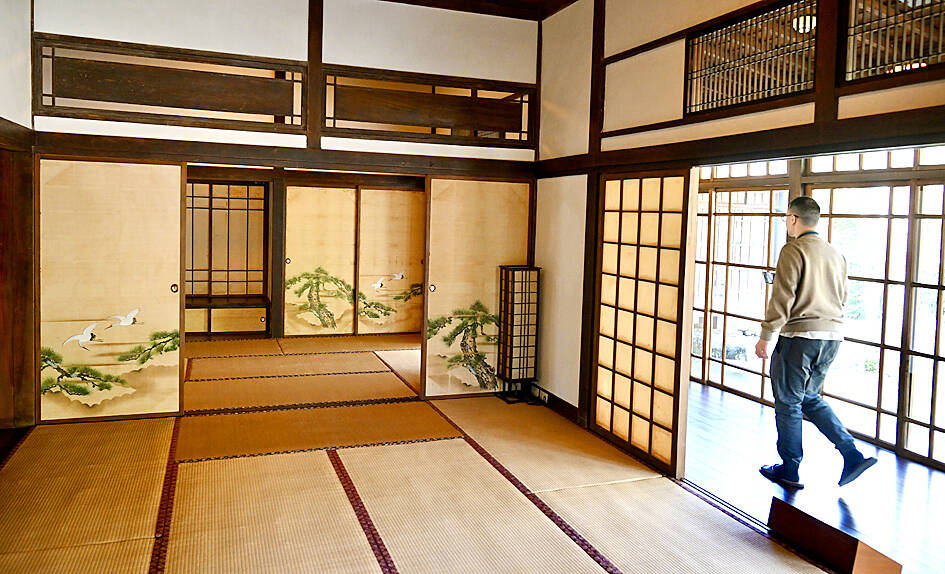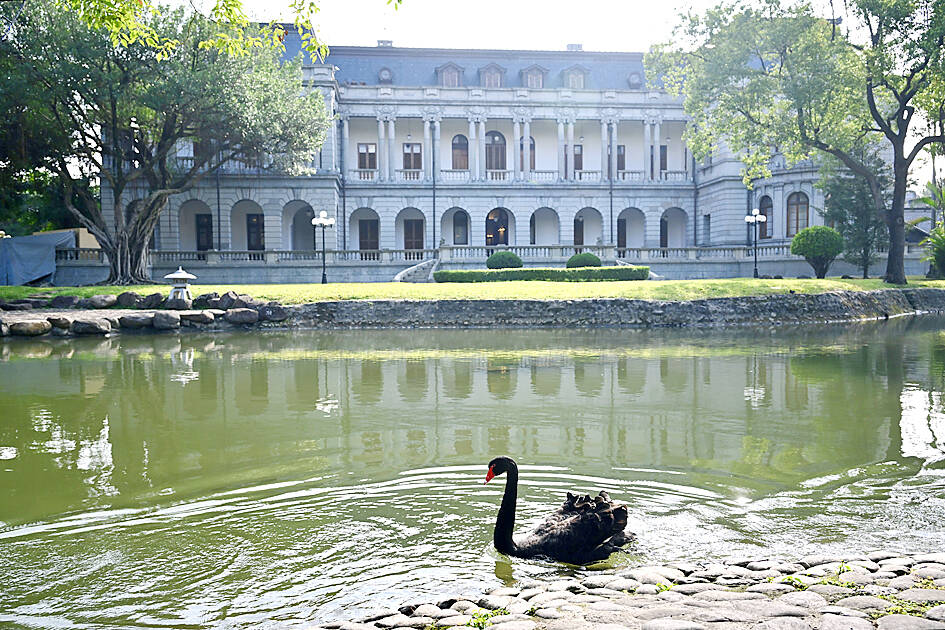Standing proudly on Ketagalan Boulevard near the Presidential Office Building is the Taipei Guest House, whose grandiose halls have for decades housed foreign dignitaries amongst European finery. However, it was only recently that reporters were granted a peek into the Japanese-style lodgings tucked away on its grounds.
Construction of the building was completed in 1901 as a residence for Taiwan’s governors-general during the Japanese colonial era. During that time, the mansion was used to welcome the Japanese imperial family, as well as foreign dignitaries and other top colonial officials.
With the arrival of the Chinese nationalists in 1946, it was renamed the Taipei Guest House while keeping its function as a reception space. More than a century later, not much has changed.

Photo: Lo Pei-de, Taipei Times
In 1998, the building was designated a national historical structure managed by the Ministry of Foreign Affairs by order of the Presidential Office.
The mansion was originally built in the Renaissance Revival style, then took on a more Baroque flair following renovations in 1913, ministry Department of General Affairs Director-General Bruce Hung (洪振榮) said on Jan. 30.
Although it has undergone numerous renovations over the years, the building has not changed aesthetically from the Japanese era, he said.

Photo: Lo Pei-de, Taipei Times
The western wing of the European-style mansion — which now serves as a reception area for foreign guests — was the office of the governor-general, while the eastern wing housed the main banquet and ceremonial halls, he said.
GREEN HIDEAWAY
The Taipei Guest House’s grounds have 720 trees of 74 different species, including 25 that are considered veteran trees. One of them, a tea tree beside the Heart Pond, was planted by Prince Chichibu during his visit to Taiwan in 1925.
Although rat traps are scattered around the grounds, Hung said that there is no infestation at the Guest House. However, the carefully maintained grounds do attract squirrels that might damage the bark, so staff use the traps to capture and move them.
Aside from the unwelcome squirrels, the pond is also home to a family of black swans that are now in their third generation.
However, the swans and Baroque halls were not the focus at a recent media open house.
Reporters instead were there for a glimpse of the Japanese-style bungalow, which is rarely open for viewing.
Appearing quaint next to its opulent neighbor, the bungalow is made entirely of Taiwan cypress, which lends its distinctive scent to its rooms, even to this day.
It used to serve as the living quarters of the governor-general, connected to the mansion by a wooden pathway. It is easy to imagine the colonial official sitting on the veranda, enjoying a panoramic view of the garden while listening to music from a nearby hall.
UNIQUE DESIGN
There are three unique design concepts used in the bungalow, Hung said.
First, the wooden doors do not have grooves or handles, but are opened automatically by gently pulling the center plank to the right, showcasing the ingenuity of Japanese craftspeople, he said.
Next, the tatami mats are arranged in a way to reflect its use as a living space, Hung said.
Finally, there is a special wooden shelf in the toilet designed to accommodate the many layers of a traditional kimono, he added.
One other design quirk can be found on the second story of the mansion. To accommodate visiting Japanese royals, every room has a fireplace.
GUIDED TOURS
The Taipei Guest House is open to the public once a month. Guided tours of the first and second floors of the mansion as well as the grounds are available.

An essay competition jointly organized by a local writing society and a publisher affiliated with the Chinese Communist Party (CCP) might have contravened the Act Governing Relations Between the People of the Taiwan Area and the Mainland Area (臺灣地區與大陸地區人民關係條例), the Mainland Affairs Council (MAC) said on Thursday. “In this case, the partner organization is clearly an agency under the CCP’s Fujian Provincial Committee,” MAC Deputy Minister and spokesperson Liang Wen-chieh (梁文傑) said at a news briefing in Taipei. “It also involves bringing Taiwanese students to China with all-expenses-paid arrangements to attend award ceremonies and camps,” Liang said. Those two “characteristics” are typically sufficient

A magnitude 5.9 earthquake that struck about 33km off the coast of Hualien City was the "main shock" in a series of quakes in the area, with aftershocks expected over the next three days, the Central Weather Administration (CWA) said yesterday. Prior to the magnitude 5.9 quake shaking most of Taiwan at 6:53pm yesterday, six other earthquakes stronger than a magnitude of 4, starting with a magnitude 5.5 quake at 6:09pm, occurred in the area. CWA Seismological Center Director Wu Chien-fu (吳健富) confirmed that the quakes were all part of the same series and that the magnitude 5.5 temblor was

The brilliant blue waters, thick foliage and bucolic atmosphere on this seemingly idyllic archipelago deep in the Pacific Ocean belie the key role it now plays in a titanic geopolitical struggle. Palau is again on the front line as China, and the US and its allies prepare their forces in an intensifying contest for control over the Asia-Pacific region. The democratic nation of just 17,000 people hosts US-controlled airstrips and soon-to-be-completed radar installations that the US military describes as “critical” to monitoring vast swathes of water and airspace. It is also a key piece of the second island chain, a string of

The Central Weather Administration has issued a heat alert for southeastern Taiwan, warning of temperatures as high as 36°C today, while alerting some coastal areas of strong winds later in the day. Kaohsiung’s Neimen District (內門) and Pingtung County’s Neipu Township (內埔) are under an orange heat alert, which warns of temperatures as high as 36°C for three consecutive days, the CWA said, citing southwest winds. The heat would also extend to Tainan’s Nansi (楠西) and Yujing (玉井) districts, as well as Pingtung’s Gaoshu (高樹), Yanpu (鹽埔) and Majia (瑪家) townships, it said, forecasting highs of up to 36°C in those areas